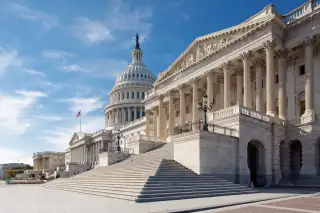What the Republican Majority Means for the Market

With most of the votes counted in the mid-term elections, Republicans picked up at least seven seats in the Senate last night, giving the GOP control of both houses of Congress for the first time in a decade.
The GOP's majority in the Senate could still widen, depending on the count in Alaska and a December run-off in Louisiana, where neither Democratic incumbent Mary Landrieu nor Republican challenger Bill Cassidy won 50% of the popular vote in a three-person race.
Are the Republicans now in position to set a new economic agenda into motion? Or will the final two years of President Obama’s term be characterized by more of the gridlock that has largely stifled serious policy discussions in recent years?
As far as Wall Street is concerned, it doesn't really matter. Here's why.
1. We are about to enter the third year of the Obama administration. And third years are hands-down the best years in the stock market.
In fact, since 1926, the S&P 500 has gained nearly 17% on average in Year 3 of presidential terms, according to the investment research firm the Leuthold Group. The next-best years for stocks are presidential election years, when equities have gained 9.8% on average.
Jeffrey Hirsch, editor-in-chief of the Stock Trader’s Almanac, adds that the Dow Jones industrial average has not suffered a third-year loss since 1939.
What accounts for the sizzling performance? Part of it has to do with the fact that the third year of an administration also tends to see the best growth in gross domestic product. Market strategists surmise that the party in power in the White House has a vested interest in stimulating the economy—and the markets—as much as it can in the year before it faces re-election.
2. Stocks surge sharply in the immediate aftermath of midterm elections.
Researchers at Leuthold discovered that stocks have risen at an annualized rate of nearly 25% (including dividends) in the period that runs from the midterm elections in November to April of the following year.
Sam Stovall, U.S. equity strategist for S&P Capital IQ, notes that "we are entering the strongest six-month period for the markets in the entire four-year presidential cycle."
He points out that this stretch coincides with two positive forces for stocks. The first is the presidential cycle. But just as important is the normal seasonal tailwind that equities enjoy from November to April, historically the best stretch for Wall Street in most years as investors emerge from the summer doldrums.
3. Washington gridlock doesn't stall markets.
Stovall broke down election year performance even further. He went back to 1901 and examined how stocks performed in years where there's been a split Congress—that is, the House is controlled by one party and the Senate by another, as was the case heading into this election.
He also looked at years in which a president of one party has to work with a unified Congress controlled by the opposition, which is what we'll have starting in 2015.
In years where a president works with a split Congress, the S&P 500 has risen around 6% on average (not counting dividends), which is slightly below the long-term average of around 7% (again, not counting dividends). However, in years where a president must work with a unified Congress controlled by the opposition party, the average return for stocks is 6.2%.
It's even better when a Democratic president must work with a Republican-led House and Republican-led Senate, like we'll have next year. In those instances, the S&P 500 has risen 8.6% annually.
"Whether it’s gridlock or unlock," notes Jack Ablin, chief investment officer for BMO Private Bank, "stock market history suggests the combination of a Republican-controlled Congress and a Democratic president is the most profitable politically."